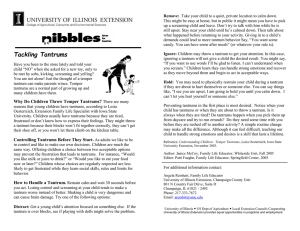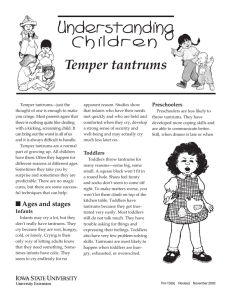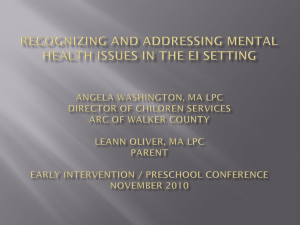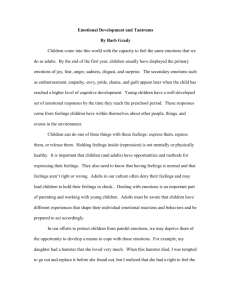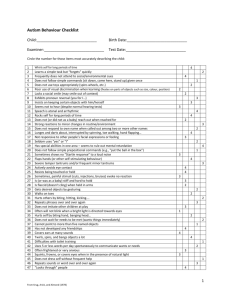Document 15529482
advertisement
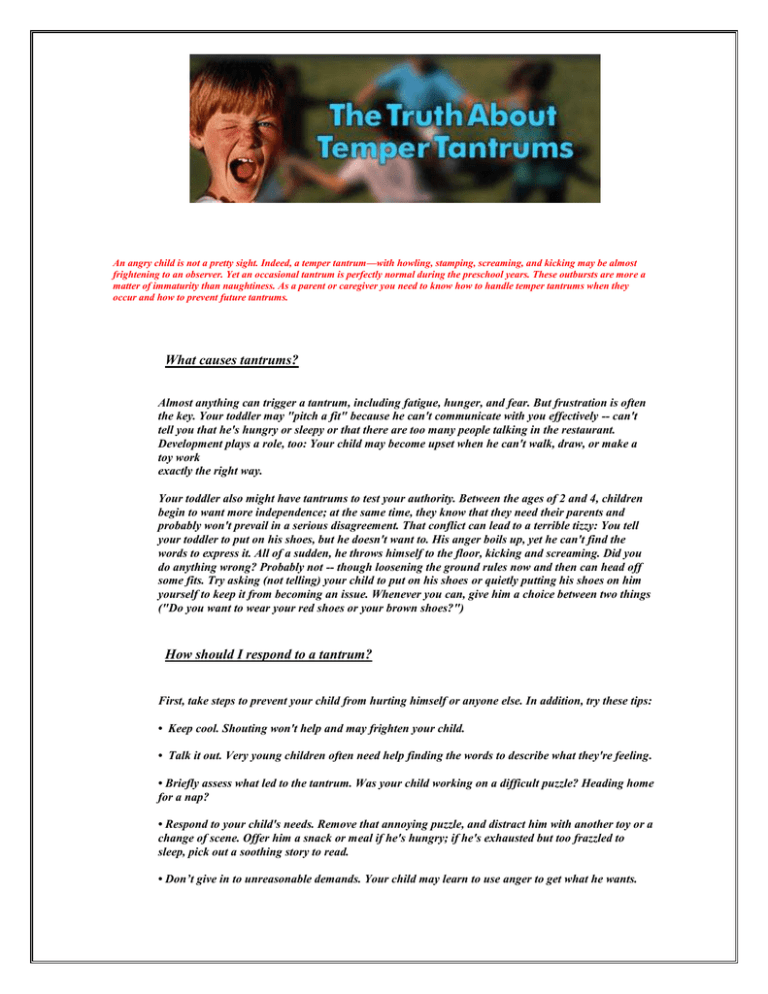
An angry child is not a pretty sight. Indeed, a temper tantrum—with howling, stamping, screaming, and kicking may be almost frightening to an observer. Yet an occasional tantrum is perfectly normal during the preschool years. These outbursts are more a matter of immaturity than naughtiness. As a parent or caregiver you need to know how to handle temper tantrums when they occur and how to prevent future tantrums. What causes tantrums? Almost anything can trigger a tantrum, including fatigue, hunger, and fear. But frustration is often the key. Your toddler may "pitch a fit" because he can't communicate with you effectively -- can't tell you that he's hungry or sleepy or that there are too many people talking in the restaurant. Development plays a role, too: Your child may become upset when he can't walk, draw, or make a toy work exactly the right way. Your toddler also might have tantrums to test your authority. Between the ages of 2 and 4, children begin to want more independence; at the same time, they know that they need their parents and probably won't prevail in a serious disagreement. That conflict can lead to a terrible tizzy: You tell your toddler to put on his shoes, but he doesn't want to. His anger boils up, yet he can't find the words to express it. All of a sudden, he throws himself to the floor, kicking and screaming. Did you do anything wrong? Probably not -- though loosening the ground rules now and then can head off some fits. Try asking (not telling) your child to put on his shoes or quietly putting his shoes on him yourself to keep it from becoming an issue. Whenever you can, give him a choice between two things ("Do you want to wear your red shoes or your brown shoes?") How should I respond to a tantrum? First, take steps to prevent your child from hurting himself or anyone else. In addition, try these tips: • Keep cool. Shouting won't help and may frighten your child. • Talk it out. Very young children often need help finding the words to describe what they're feeling. • Briefly assess what led to the tantrum. Was your child working on a difficult puzzle? Heading home for a nap? • Respond to your child's needs. Remove that annoying puzzle, and distract him with another toy or a change of scene. Offer him a snack or meal if he's hungry; if he's exhausted but too frazzled to sleep, pick out a soothing story to read. • Don’t give in to unreasonable demands. Your child may learn to use anger to get what he wants. • Don’t get physical. Spanking and hitting only add fuel to the emotional fire. • Don’t reward your child for ending his tantrum. Instead, hold him close and talk about what happened. If your child's outburst escalates to the point where he's hitting people or pets, throwing objects, or screaming nonstop, your response must be firm. Put him in a safe place, such as his bedroom, where he can't harm himself. Tell him why he's there ("because you hit Aunt Sally"), and let him know he has to stay put until his unruly behavior stops. How can I prevent tantrums? The key is learning when and why your child's tantrums happen. Keep a diary, and any time your child has a tantrum, note what led up to it and what helped end it. Did your child lose control after a long day when dinner was later than usual? Does he have tantrums at restaurants, friends' houses, and other places where he feels less secure than at home? In addition, do what you can to eliminate or reduce the demands and activities that frustrate your child. Is that puzzle too difficult? Look for toys better suited to his skills and age. These tips will also help: • Keep your expectations realistic. Remember that it's normal for a young child to whine and resist now and then. • Offer choices when you can. No one likes being told what to do all the time. "Would you like corn or carrots?" is better than "Eat your corn!" • Choose your battles. Would it really wreck your schedule to spend an extra five minutes at the playground? • Give your child a gentle heads-up before a change, such as leaving the playground or sitting down to dinner. "We're going to eat in 10 minutes" gives him a chance to adjust instead of react. What if nothing seems to work? Talk to your pediatrician or family doctor if your child's tantrums are so frequent or so severe that the coping methods described here don't help. You should also call the doctor if your child harms himself or others, holds his breath to the point of fainting, or commonly has tantrums after he's passed the age of 3 and a half. Your doctor can make sure there's no serious physical or psychological problem triggering the behavior and may suggest ways to deal with the outbursts. All contents copyright © 1999 - 2004 Blue Cross-and Blue Shield of Massachusetts, Inc. ®
